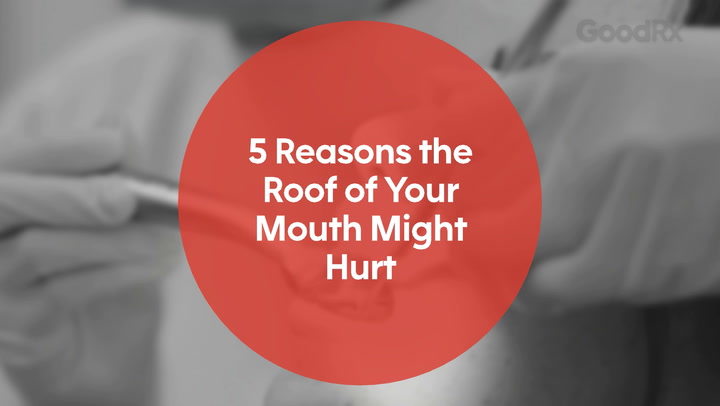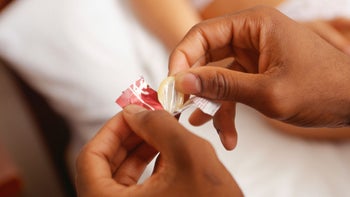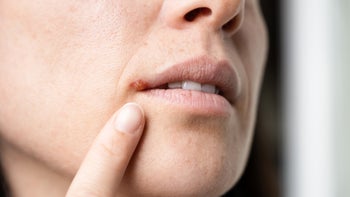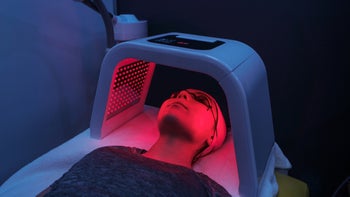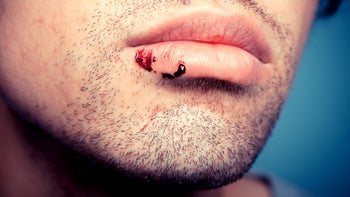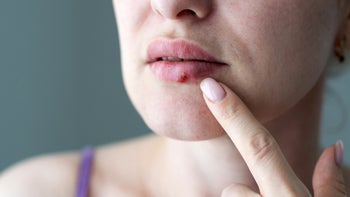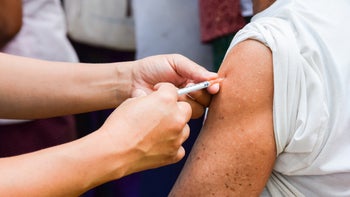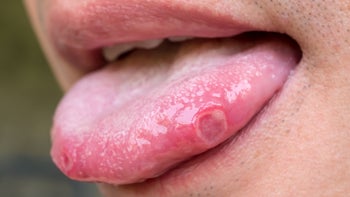
Your Guide to Herpes Creams: Over-the-Counter and Prescription
Key takeaways:
Oral herpes, also known as cold sores or fever blisters, is caused by a contagious virus called the herpes simplex virus (HSV).
Cold sores are small painful blisters that are usually found around the edge of the mouth and lips.
Both over-the-counter (OTC) and prescription herpes creams exist to treat cold sores. In some cases, oral antiviral medications may be needed to treat an outbreak.
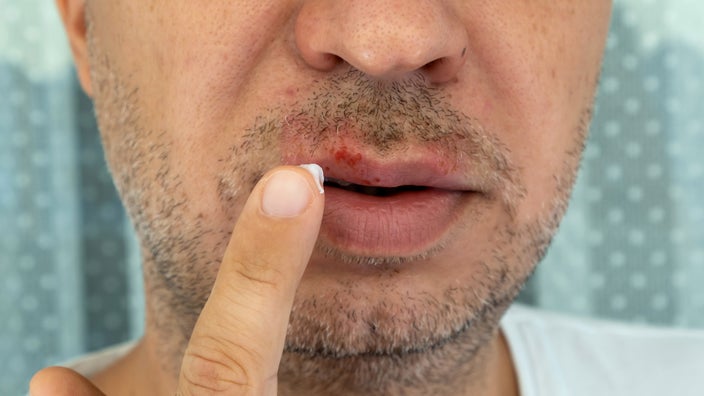
Many adults and children have experienced small, painful blisters at the edge of their mouths, known as cold sores. They can appear when you’re stressed, sick, or exposed to temperature extremes. But regardless of why they show up, they’re always unwelcome.
You may be quick to run to the pharmacy aisle or call your healthcare provider for fast relief. But with all the different cold sore creams and oral herpes treatments, which is the best option? In this article, we’ll take a quick look at what causes oral herpes and which treatment might be right for you.
What causes oral herpes (cold sores)?
Oral herpes (herpes labialis) is a common condition. Many people know it as cold sores or fever blisters. This condition is caused by the herpes simplex virus (HSV). There are two different types of HSV. Type 1 HSV is most often associated with oral herpes and can cause sores on or around the mouth. Type 2 HSV typically causes genital herpes. We’ll only be talking about oral herpes in this article.
Search and compare options
HSV, commonly referred to as herpes, is a virus that can be spread from person to person. Oral herpes is usually spread through saliva (spit) or by touching another person’s active cold sore. There’s currently no cure or vaccine for herpes, but outbreaks typically resolve within a few weeks.
What OTC creams are good for herpes?
Now that we have an understanding of where cold sores come from, let’s take a look at the different types of oral herpes treatments. There are a few over-the-counter (OTC) herpes creams available.
Hydrocortisone
Hydrocortisone is a topical corticosteroid that comes in a variety of different forms, including creams, ointments, and lotions. Depending on the strength, hydrocortisone is available with or without a prescription. Strengths 1% and lower are available OTC, but higher strengths require a prescription from a healthcare provider.
Hydrocortisone works to reduce redness, itching, and pain from many skin conditions. As a cold sore cream, hydrocortisone doesn’t do anything to treat or prevent the herpes virus. Rather it helps to ease the symptoms associated with an outbreak.
When used appropriately, OTC hydrocortisone cream has few side effects. But it can cause some mild skin issues, such as itching, dryness, or redness. A tube at your local pharmacy or grocery store is generally inexpensive. Using a free GoodRx coupon can lower the price even more — sometimes to less than $6 per tube at certain pharmacies.
Using a GoodRx coupon for OTC products requires some extra steps, including having a healthcare provider write a prescription for it. Be sure to check out our article on how to use GoodRx coupons for OTC medications for more information.
Abreva (Docosanol)
Abreva (docosanol) is available as an OTC herpes cream. The medication works by interfering with the way HSV attaches to the cells in your body. This helps to shorten the length of a cold sore outbreak, as well as relieve the pain and severity of cold sores.
According to the American Academy of Family Physicians, Abreva should be applied within 12 hours of the first signs of an outbreak. It’s recommended to apply it 5 times a day until your cold sore goes away (usually within 10 days).
Abreva’s average retail price is around $20 per tube, but it could cost less than $10 with a GoodRx coupon. Side effects are minimal. But you should contact your healthcare provider if your cold sores get worse or last longer than 10 days.
Lysine cream
Lysine is an essential amino acid (the building blocks for proteins). When an amino acid is considered essential, it means our bodies don’t make it naturally. We must consume lysine as part of our diets, usually from foods, such as red meats, fish, and eggs.
As a treatment for oral herpes, lysine is thought to help by lowering the levels of another amino acid in our bodies called arginine. HSV requires proteins rich in arginine to make copies of itself. By raising the amount of lysine in the body, the amount of arginine should go down. In theory, this should relieve or prevent cold sores.
However, little data exist for using lysine as an effective cold sore cream. One literature review published in 2017 found no convincing evidence that using lysine would treat or prevent active cold sores.
Prescription creams for herpes
There are also a few prescription herpes creams available. Your healthcare provider will help decide which option might be best for you.
Acyclovir (Zovirax)
Acyclovir (Zovirax) 5% cream or ointment is an antiviral medication with several important uses. In addition to being an effective treatment for oral herpes, Zovirax can also be used to treat outbreaks and rashes caused by the virus that causes chickenpox and shingles. Acyclovir works by stopping HSV’s ability to reproduce.
As a cold sore cream, acyclovir has been shown to shorten the length of an outbreak by about half a day. Acyclovir cream is well tolerated with few side effects. The most common issues people experience are skin irritation and dry or cracked lips.
Acyclovir cream can be expensive without insurance. Even though a generic version is available, the average retail cost for one tube is close to $800. GoodRx can lower this price to about $75 at certain pharmacies.
Penciclovir (Denavir)
Penciclovir (Denavir) 1% cream is another prescription antiviral medication used as a herpes cream. The active medication in the cream works in a similar way to acyclovir.
While we know that penciclovir is better than no treatment for oral herpes, we’re not as clear about how it compares to acyclovir. One study showed penciclovir works better than acyclovir, while another showed there was no significant difference in effectiveness.
The biggest differences between the two herpes creams are usually in how they’re used and how much they cost. Penciclovir is typically applied to cold sores every 2 hours (while you’re awake) and acyclovir is applied 5 times per day. Penciclovir is also only available as a brand-name medication, so it may be expensive. The average cost for one tube of penciclovir is close to $1,000. Even with a GoodRx coupon, it could still cost around $800.
Xerese (acyclovir/hydrocortisone)
Xerese (acyclovir/hydrocortisone) includes both acyclovir 5% and hydrocortisone 1%. Xerese has been shown to shorten healing time and make cold sores less likely to return. Research also suggests that it works better than acyclovir cream by itself.
Unfortunately, Xerese is expensive, and it may not be covered by all insurance plans. Even with a GoodRx coupon, one tube can cost well over $1,200. But it is a combination of two creams that have generics available. Talk to your healthcare provider and pharmacist. They may suggest getting those two oral herpes creams separately and then mixing them together. This could save you money and offer a potentially more effective treatment.
Additional treatment for oral herpes
Antiviral pills are often a better choice for treating oral herpes, especially if you have recurrent outbreaks (outbreaks that come back many times). They’re typically less expensive than oral herpes creams and are effective options to consider.
If you have persistent oral herpes infections, taking oral antiviral medications may be a better option than creams. Here are three of the most commonly used oral antivirals with their typical cold sore treatment doses:
Valacyclovir (Valtrex): 2,000 mg by mouth every 12 hours for 1 day
Famciclovir: 1,500 mg by mouth one time only
Acyclovir buccal tablets (Sitavig): 50 mg dissolved in the cheek one time only. Healthcare providers sometimes prescribe different doses of oral acyclovir capsules and tablets. This is considered an off-label use, as they’re not FDA-approved for treating cold sores.
There are currently no studies that directly compare all three antiviral medications. But a review of multiple studies found that valacyclovir healed cold sores faster than acyclovir.
The bottom line
Cold sores can be a painful and frustrating issue to deal with. They’re caused by a virus called the herpes simplex virus (HSV). Cold sores can be triggered by several factors, such as stress, illness, or extreme temperatures.
Several treatments for oral herpes are available, including both OTC and prescription oral herpes creams. Sometimes, these creams may not be enough, especially if outbreaks happen frequently. These situations may require oral antiviral medications to get relief.
If you’re experiencing cold sores, always remember to consult with your healthcare provider. They’ll work with you to find the best, most effective treatment for you.
Why trust our experts?



References
Bausch Health US, LLC. (2021). Zovirax [package insert].
Chen, F., et al. (2017). Efficacy and safety of nucleoside antiviral drugs for treatment of recurrent herpes labialis: A systematic review and meta-analysis. Journal of Oral Pathology & Medicine.
EPI Health, Inc. (2020). Sitavig [package insert].
Hammer, K. D. P., et al. (2018). A systematic review on the efficacy of topical acyclovir, penciclovir, and docosanol for the treatment of herpes simplex labialis. EMJ Dermatology.
Hull, C. M., et al. (2014). Novel composite efficacy measure to demonstrate the rationale and efficacy of combination antiviral–anti-inflammatory treatment for recurrent herpes simplex labialis. Antimicrobial Agents and Chemotherapy.
Larson, A., et al. (2019). Table 5 [Nutritional requirements for L-lysine, L-carnitine, calories, and natural protein for infants and children with GA-1]. GeneReviews.
Mailoo, V. J., et al. (2017). Lysine for herpes simplex prophylaxis: A review of the evidence. Integrative Medicine: A Clinician's Journal.
MedlinePlus. (n.d.). Amino acids.
MedlinePlus. (2016). Cold sores.
National Institute of Dental and Craniofacial Research. (2021). Fever blisters & canker sores.
Spruance, S. L., et al. (2002). Acyclovir cream for treatment of herpes simplex labialis: Results of two randomized, double-blind, vehicle-controlled, multicenter clinical trials. Antimicrobial Agents and Chemotherapy.
Thongprasom, K., et al. (2019). Effectiveness of topical steroids in treating herpes-associated erythema multiforme and review of topical steroids. Journal of Dentistry Indonesia.
Usatine, R. P., et al. (2010). Nongenital herpes simplex virus. American Family Physician.
World Health Organization. (2022). Herpes simplex virus.


